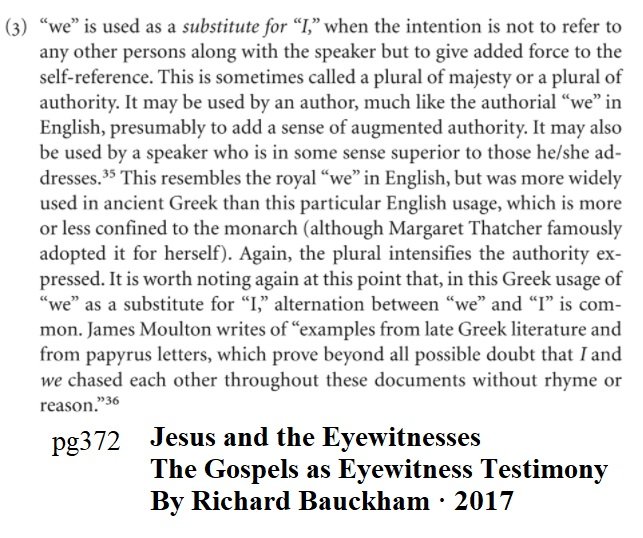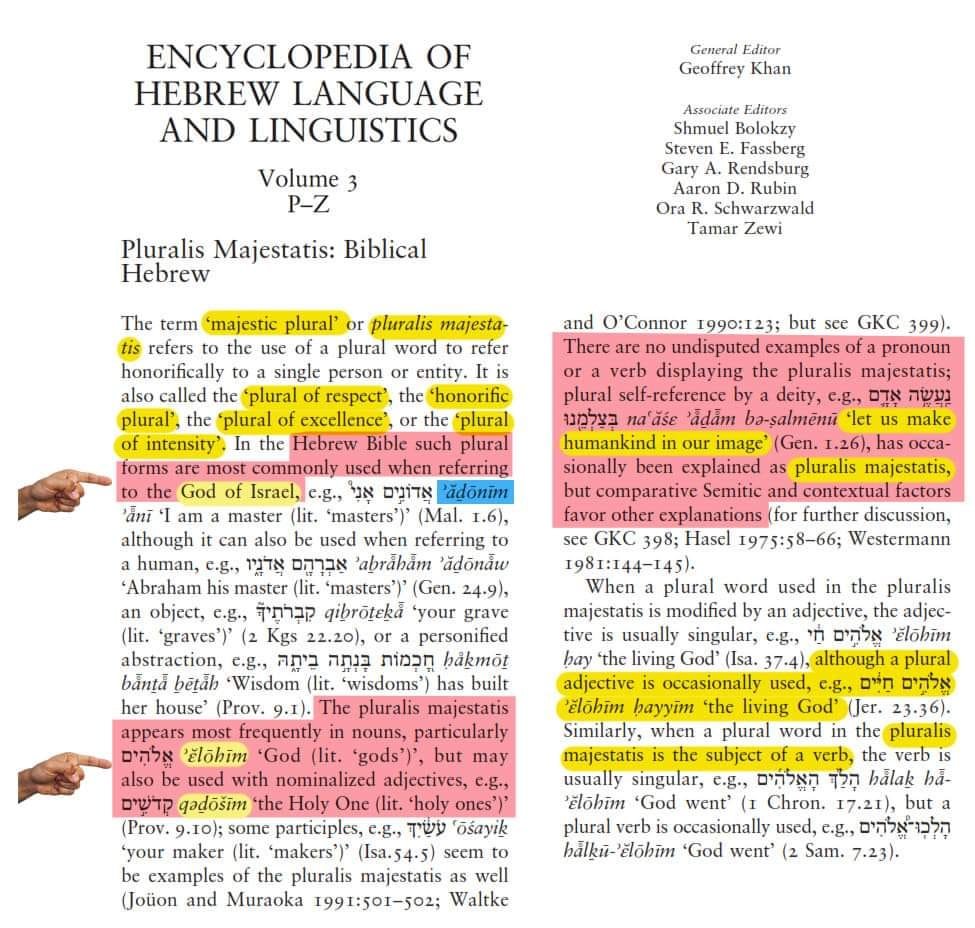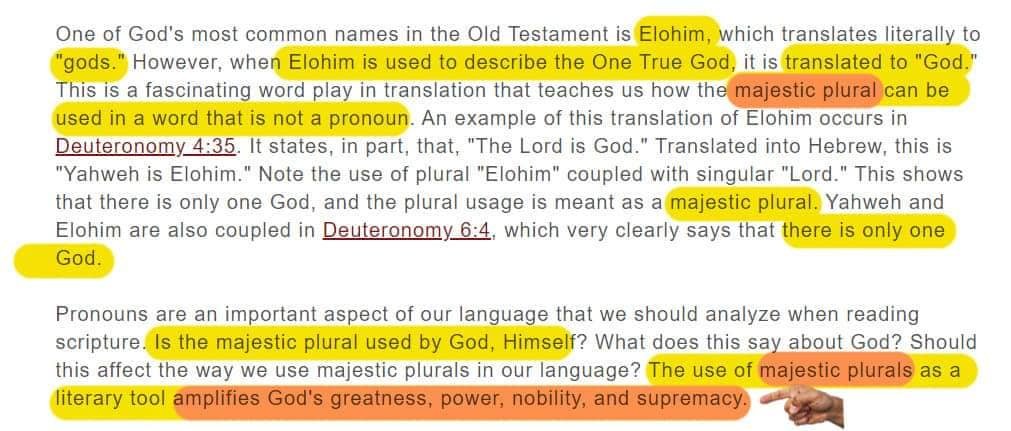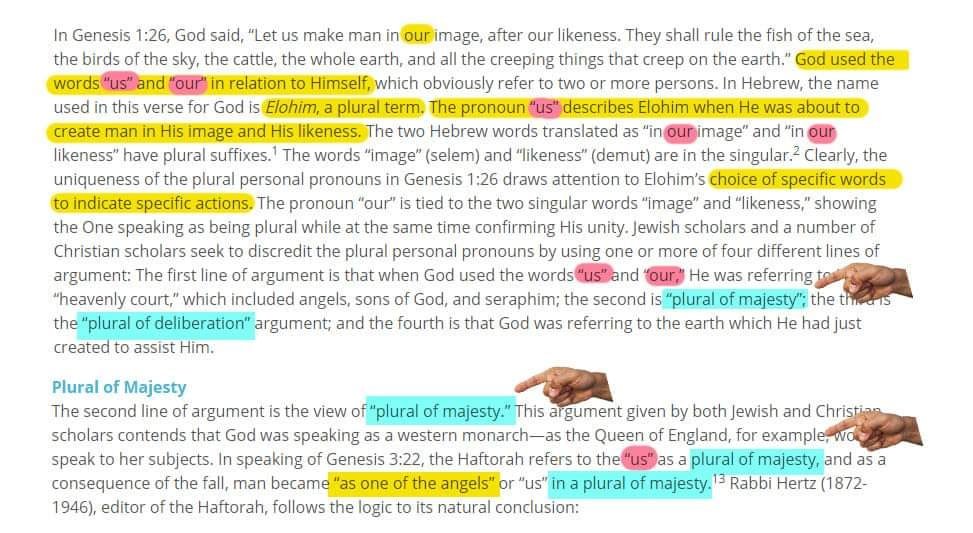𝐀𝐥𝐥𝐚𝐡 𝐚𝐧𝐝 𝐭𝐡𝐞 𝐩𝐫𝐨𝐧𝐨𝐮𝐧 ‘𝐇𝐞’
Mohamad Mostafa Nassar
Twitter:@NassarMohamadMR
𝐐𝐮𝐞𝐬𝐭𝐢𝐨𝐧:
𝐖𝐡𝐲 𝐢𝐬 𝐀𝐥𝐥𝐚𝐡 𝐚𝐥𝐰𝐚𝐲𝐬 𝐫𝐞𝐟𝐞𝐫𝐫𝐞𝐝 𝐭𝐨 𝐚𝐬 ‘𝐇𝐞’? 𝐈 𝐚𝐬𝐤 𝐭𝐡𝐢𝐬 𝐛𝐞𝐜𝐚𝐮𝐬𝐞 𝐦𝐲 𝐭𝐞𝐚𝐜𝐡𝐞𝐫 𝐢𝐧 𝐭𝐡𝐞 𝐜𝐥𝐚𝐬𝐬 𝐫𝐚𝐢𝐬𝐞𝐝 𝐭𝐡𝐢𝐬 𝐢𝐬𝐬𝐮𝐞.
𝐀𝐧𝐬𝐰𝐞𝐫:
𝐓𝐡𝐞 𝐅𝐚𝐭𝐰𝐚 𝐃𝐞𝐩𝐚𝐫𝐭𝐦𝐞𝐧𝐭 𝐑𝐞𝐬𝐞𝐚𝐫𝐜𝐡 𝐂𝐨𝐦𝐦𝐢𝐭𝐭𝐞𝐞 – 𝐜𝐡𝐚𝐢𝐫𝐞𝐝 𝐛𝐲 𝐒𝐡𝐞𝐢𝐤𝐡 `𝐀𝐛𝐝 𝐚𝐥-𝐖𝐚𝐡𝐡𝐚̂𝐛 𝐚𝐥-𝐓𝐮𝐫𝐚𝐲𝐫𝐢̂
𝐀𝐥𝐥𝐚𝐡 𝐬𝐚𝐲𝐬: “𝐇𝐞 𝐜𝐫𝐞𝐚𝐭𝐞𝐝 𝐭𝐡𝐞 𝐩𝐚𝐢𝐫𝐬, 𝐦𝐚𝐥𝐞 𝐚𝐧𝐝 𝐟𝐞𝐦𝐚𝐥𝐞.” [𝐒𝐮̂𝐫𝐚𝐡 𝐚𝐥-𝐍𝐚𝐣𝐦: 𝟒𝟓]
𝐀𝐥𝐥𝐚𝐡 𝐢𝐬 𝐭𝐡𝐞 𝐂𝐫𝐞𝐚𝐭𝐨𝐫 𝐨𝐟 𝐛𝐨𝐭𝐡 𝐬𝐞𝐱𝐞𝐬. 𝐖𝐞 𝐝𝐨 𝐧𝐨𝐭 𝐚𝐭𝐭𝐫𝐢𝐛𝐮𝐭𝐞 𝐛𝐞𝐢𝐧𝐠 𝐦𝐚𝐥𝐞 𝐨𝐫 𝐟𝐞𝐦𝐚𝐥𝐞 𝐭𝐨 𝐀𝐥𝐥𝐚𝐡. 𝐖𝐞 𝐨𝐧𝐥𝐲 𝐝𝐞𝐬𝐜𝐫𝐢𝐛𝐞 𝐀𝐥𝐥𝐚𝐡 𝐚𝐬 𝐇𝐞 𝐝𝐞𝐬𝐜𝐫𝐢𝐛𝐞𝐬 𝐡𝐢𝐦𝐬𝐞𝐥𝐟 𝐨𝐫 𝐚𝐬 𝐇𝐢𝐬 𝐏𝐫𝐨𝐩𝐡𝐞𝐭 (𝐩𝐞𝐚𝐜𝐞 𝐛𝐞 𝐮𝐩𝐨𝐧 𝐡𝐢𝐦) 𝐝𝐞𝐬𝐜𝐫𝐢𝐛𝐞𝐬 𝐇𝐢𝐦. 𝐓𝐡𝐞 𝐩𝐫𝐢𝐦𝐚𝐫𝐲 𝐫𝐞𝐚𝐬𝐨𝐧 𝐭𝐡𝐚𝐭 𝐭𝐡𝐞 𝐩𝐫𝐨𝐧𝐨𝐮𝐧 “𝐇𝐞” 𝐢𝐬 𝐮𝐬𝐞𝐝 𝐭𝐨 𝐫𝐞𝐟𝐞𝐫 𝐭𝐨 𝐀𝐥𝐥𝐚𝐡 𝐢𝐬 𝐭𝐡𝐚𝐭 𝐇𝐞 𝐜𝐡𝐨𝐨𝐬𝐞𝐬 𝐭𝐨 𝐮𝐬𝐞 𝐭𝐡𝐞 𝐩𝐫𝐨𝐧𝐨𝐮𝐧 𝐟𝐨𝐫 𝐇𝐢𝐦𝐬𝐞𝐥𝐟.
𝐈𝐭 𝐢𝐬 𝐚𝐥𝐬𝐨 𝐢𝐧 𝐜𝐨𝐧𝐟𝐨𝐫𝐦𝐢𝐭𝐲 𝐰𝐢𝐭𝐡 𝐭𝐡𝐞 𝐝𝐢𝐜𝐭𝐚𝐭𝐞𝐬 𝐨𝐟 𝐭𝐡𝐞 𝐀𝐫𝐚𝐛𝐢𝐜 𝐥𝐚𝐧𝐠𝐮𝐚𝐠𝐞 𝐢𝐧 𝐰𝐡𝐢𝐜𝐡 𝐭𝐡𝐞 𝐐𝐮𝐫’𝐚̂𝐧 𝐰𝐚𝐬 𝐫𝐞𝐯𝐞𝐚𝐥𝐞𝐝. 𝐈𝐧𝐝𝐞𝐞𝐝, 𝐀𝐥𝐥𝐚𝐡 𝐬𝐚𝐲𝐬: “𝐕𝐞𝐫𝐢𝐥𝐲 𝐭𝐡𝐢𝐬 𝐢𝐬 𝐚 𝐫𝐞𝐯𝐞𝐥𝐚𝐭𝐢𝐨𝐧 𝐟𝐫𝐨𝐦 𝐭𝐡𝐞 𝐋𝐨𝐫𝐝 𝐨𝐟 𝐭𝐡𝐞 𝐖𝐨𝐫𝐥𝐝𝐬. 𝐖𝐢𝐭𝐡 𝐢𝐭 𝐜𝐚𝐦𝐞 𝐝𝐨𝐰𝐧 𝐭𝐡𝐞 𝐅𝐚𝐢𝐭𝐡𝐟𝐮𝐥 𝐒𝐩𝐢𝐫𝐢𝐭 𝐭𝐨 𝐲𝐨𝐮𝐫 𝐡𝐞𝐚𝐫𝐭 – 𝐬𝐨 𝐭𝐡𝐚𝐭 𝐲𝐨𝐮 𝐦𝐚𝐲 𝐛𝐞 𝐚𝐦𝐨𝐧𝐠 𝐭𝐡𝐨𝐬𝐞 𝐰𝐡𝐨 𝐠𝐢𝐯𝐞 𝐰𝐚𝐫𝐧𝐢𝐧𝐠 – 𝐢𝐧 𝐚 𝐜𝐥𝐞𝐚𝐫 𝐀𝐫𝐚𝐛𝐢𝐜 𝐭𝐨𝐧𝐠𝐮𝐞.” [𝐒𝐮̂𝐫𝐚𝐡 𝐚𝐥-𝐒𝐡𝐮`𝐚𝐫𝐚̂’: 𝟏𝟗𝟐-𝟏𝟗𝟓]
𝐈𝐧 𝐭𝐡𝐞 𝐀𝐫𝐚𝐛𝐢𝐜 𝐥𝐚𝐧𝐠𝐮𝐚𝐠𝐞, 𝐭𝐡𝐞𝐫𝐞 𝐢𝐬 𝐧𝐨 𝐩𝐫𝐨𝐧𝐨𝐮𝐧 𝐰𝐢𝐭𝐡 𝐚 𝐧𝐞𝐮𝐭𝐫𝐚𝐥 𝐠𝐞𝐧𝐝𝐞𝐫 𝐞𝐪𝐮𝐢𝐯𝐚𝐥𝐞𝐧𝐭 𝐭𝐨 𝐭𝐡𝐞 𝐄𝐧𝐠𝐥𝐢𝐬𝐡 “𝐢𝐭”. (𝐄𝐯𝐞𝐧 𝐢𝐧 𝐄𝐧𝐠𝐥𝐢𝐬𝐡, 𝐭𝐡𝐢𝐬 𝐧𝐞𝐮𝐭𝐫𝐚𝐥 𝐠𝐞𝐧𝐝𝐞𝐫𝐞𝐝 𝐩𝐫𝐨𝐧𝐨𝐮𝐧 𝐢𝐬 𝐧𝐨𝐭 𝐭𝐨 𝐛𝐞 𝐮𝐬𝐞𝐝 𝐟𝐨𝐫 𝐛𝐞𝐢𝐧𝐠𝐬 𝐩𝐨𝐬𝐬𝐞𝐬𝐬𝐢𝐧𝐠 𝐭𝐡𝐞 𝐚𝐭𝐭𝐫𝐢𝐛𝐮𝐭𝐞𝐬 𝐨𝐟 𝐤𝐧𝐨𝐰𝐥𝐞𝐝𝐠𝐞, 𝐩𝐨𝐰𝐞𝐫, 𝐚𝐧𝐝 𝐰𝐢𝐥𝐥. 𝐈𝐧 𝐄𝐧𝐠𝐥𝐢𝐬𝐡, 𝐢𝐭 𝐰𝐨𝐮𝐥𝐝 𝐛𝐞 𝐚 𝐬𝐢𝐠𝐧 𝐨𝐟 𝐝𝐢𝐬𝐫𝐞𝐬𝐩𝐞𝐜𝐭 𝐭𝐨 𝐮𝐬𝐞 𝐭𝐡𝐞 𝐩𝐫𝐨𝐧𝐨𝐮𝐧 “𝐢𝐭” 𝐢𝐧 𝐬𝐮𝐜𝐡 𝐚 𝐜𝐨𝐧𝐭𝐞𝐱𝐭.)
𝐈𝐧 𝐀𝐫𝐚𝐛𝐢𝐜, 𝐰𝐡𝐞𝐧 𝐭𝐡𝐞 𝐠𝐞𝐧𝐝𝐞𝐫 𝐨𝐟 𝐭𝐡𝐞 𝐬𝐮𝐛𝐣𝐞𝐜𝐭 𝐢𝐬 𝐮𝐧𝐤𝐧𝐨𝐰𝐧 𝐨𝐫 𝐮𝐧𝐬𝐩𝐞𝐜𝐢𝐟𝐢𝐞𝐝 𝐨𝐫 𝐰𝐡𝐞𝐧 𝐭𝐡𝐞 𝐬𝐮𝐛𝐣𝐞𝐜𝐭 𝐢𝐬 𝐩𝐥𝐮𝐫𝐚𝐥 𝐚𝐧𝐝 𝐜𝐨𝐧𝐭𝐚𝐢𝐧𝐬 𝐛𝐨𝐭𝐡 𝐦𝐚𝐥𝐞 𝐚𝐧𝐝 𝐟𝐞𝐦𝐚𝐥𝐞 𝐢𝐧𝐝𝐢𝐯𝐢𝐝𝐮𝐚𝐥𝐬, 𝐭𝐡𝐞 𝐦𝐚𝐬𝐜𝐮𝐥𝐢𝐧𝐞 𝐩𝐫𝐨𝐧𝐨𝐮𝐧 𝐰𝐢𝐥𝐥 𝐛𝐞 𝐮𝐬𝐞𝐝. 𝐈𝐧 𝐀𝐫𝐚𝐛𝐢𝐜, 𝐭𝐡𝐞 𝐦𝐚𝐬𝐜𝐮𝐥𝐢𝐧𝐞 𝐩𝐫𝐨𝐧𝐨𝐮𝐧 𝐢𝐬 𝐭𝐡𝐞 𝐝𝐞𝐟𝐚𝐮𝐥𝐭 𝐩𝐫𝐨𝐧𝐨𝐮𝐧.
𝐈𝐭 𝐝𝐨𝐞𝐬 𝐧𝐨𝐭 𝐡𝐚𝐯𝐞 𝐭𝐨 𝐢𝐦𝐩𝐥𝐲 𝐦𝐚𝐬𝐜𝐮𝐥𝐢𝐧𝐢𝐭𝐲. 𝐈𝐭 𝐜𝐚𝐧 𝐛𝐞 𝐮𝐬𝐞𝐝 𝐛𝐲 𝐚 𝐬𝐩𝐞𝐚𝐤𝐞𝐫 𝐰𝐢𝐭𝐡𝐨𝐮𝐭 𝐦𝐚𝐬𝐜𝐮𝐥𝐢𝐧𝐢𝐭𝐲 𝐛𝐞𝐢𝐧𝐠 𝐢𝐧𝐭𝐞𝐧𝐝𝐞𝐝 𝐁𝐲 𝐜𝐨𝐧𝐭𝐫𝐚𝐬𝐭, 𝐟𝐞𝐦𝐚𝐥𝐞 𝐩𝐫𝐨𝐧𝐨𝐮𝐧𝐬 𝐥𝐢𝐤𝐞 “𝐬𝐡𝐞” 𝐢𝐧 𝐀𝐫𝐚𝐛𝐢𝐜 𝐚𝐫𝐞 𝐮𝐬𝐞𝐝 𝐞𝐱𝐜𝐥𝐮𝐬𝐢𝐯𝐞𝐥𝐲 𝐰𝐡𝐞𝐧 𝐭𝐡𝐞 𝐬𝐮𝐛𝐣𝐞𝐜𝐭 𝐢𝐬 𝐟𝐞𝐦𝐚𝐥𝐞. 𝐅𝐞𝐦𝐢𝐧𝐢𝐧𝐞 𝐩𝐫𝐨𝐧𝐨𝐮𝐧𝐬 𝐜𝐚𝐧𝐧𝐨𝐭 𝐛𝐞 𝐮𝐬𝐞𝐝 𝐢𝐧 𝐚𝐧𝐲 𝐨𝐭𝐡𝐞𝐫 𝐜𝐨𝐧𝐭𝐞𝐱𝐭.
𝐓𝐡𝐞𝐫𝐞𝐟𝐨𝐫𝐞, 𝐢𝐭 𝐢𝐬 𝐨𝐛𝐯𝐢𝐨𝐮𝐬 𝐰𝐡𝐲 𝐭𝐡𝐞 𝐩𝐫𝐨𝐧𝐨𝐮𝐧 “𝐬𝐡𝐞” 𝐰𝐨𝐮𝐥𝐝 𝐧𝐨𝐭 𝐛𝐞 𝐮𝐬𝐞𝐝 𝐭𝐨 𝐫𝐞𝐟𝐞𝐫 𝐭𝐨 𝐀𝐥𝐥𝐚𝐡, 𝐬𝐢𝐧𝐜𝐞 𝐭𝐡𝐚𝐭 𝐰𝐨𝐮𝐥𝐝 𝐢𝐧𝐝𝐞𝐞𝐝 𝐛𝐞 𝐬𝐩𝐞𝐜𝐢𝐟𝐲𝐢𝐧𝐠 𝐚 𝐠𝐞𝐧𝐝𝐞𝐫. 𝐀𝐧𝐝 𝐀𝐥𝐥𝐚𝐡 𝐤𝐧𝐨𝐰𝐬 𝐛𝐞𝐬𝐭.
𝐖𝐞 𝐡𝐨𝐩𝐞 𝐭𝐡𝐚𝐭 𝐭𝐡𝐢𝐬 𝐚𝐧𝐬𝐰𝐞𝐫 𝐜𝐥𝐚𝐫𝐢𝐟𝐢𝐞𝐬 𝐭𝐡𝐞 𝐦𝐚𝐭𝐭𝐞𝐫 𝐟𝐨𝐫 𝐲𝐨𝐮.
𝐋𝐞𝐭 𝐮𝐬 𝐰𝐚𝐭𝐜𝐡 𝐭𝐡𝐢𝐬 𝐯𝐢𝐝𝐞𝐨: 𝐖𝐡𝐲 𝐢𝐬 𝐀𝐥𝐥𝐚𝐡 𝐚𝐥𝐰𝐚𝐲𝐬 𝐫𝐞𝐟𝐞𝐫𝐫𝐞𝐝 𝐭𝐨 𝐚𝐬 ‘𝐇𝐞/ هو’ 𝐚𝐧𝐝 𝐍𝐨𝐭 ‘𝐬𝐡𝐞/ هي’ | 𝐀𝐫𝐚𝐛𝐢𝐜𝟏𝟎𝟏
Allah knows Best.

𝐈𝐧 𝐜𝐚𝐬𝐞 𝐭𝐡𝐞 𝐂𝐡𝐫𝐢𝐬𝐭𝐢𝐚𝐧𝐬 𝐚𝐭𝐭𝐚𝐜𝐤 𝐈𝐬𝐥𝐚𝐦 𝐚𝐛𝐨𝐮𝐭 𝐭𝐡𝐞 “𝐑𝐨𝐲𝐚𝐥 𝐖𝐞” (𝐖𝐞, 𝐔𝐬, 𝐎𝐮𝐫) 𝐢𝐧 𝐓𝐡𝐞 𝐆𝐥𝐨𝐫𝐢𝐨𝐮𝐬 𝐇𝐨𝐥𝐲 𝐐𝐮𝐫𝐚𝐧. 𝐑𝐨𝐲𝐚𝐥 𝐖𝐞 (𝐌𝐚𝐣𝐞𝐬𝐭𝐢𝐜 𝐏𝐥𝐮𝐫𝐚𝐥) 𝐚𝐥𝐬𝐨 𝐞𝐱𝐢𝐬𝐭 𝐢𝐧 𝐭𝐡𝐞𝐢𝐫 𝐁𝐢𝐛𝐥𝐞.




𝐀𝐥𝐥𝐚𝐡 𝐊𝐧𝐨𝐰𝐬 𝐁𝐞𝐬𝐭.
𝐑𝐞𝐟𝐞𝐫𝐞𝐧𝐞𝐜𝐬:
Why Do We Refer to God Using the Masculine Pronoun?
The use of the plural “We” by God in the Quran- The Majestic We
Why Quran uses masculine pronouns (He/Him/His) for Allah?
God using the plural for Himself
The Concept of “We” as used in The Qur’an by Allah
𝐒𝐨𝐮𝐫𝐜𝐞: 𝐈𝐬𝐥𝐚𝐦 𝐰𝐚𝐲